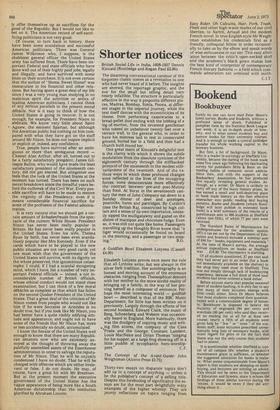Bookend
Bookbuyer
Surely no one can have read Peter Mann's latest survey, Books and Students, without a profound sense of shock. Published in
. pamphlet form by the National Book League last week, it is an in-depth study of how, why, and to what extent students buy and borrow books for their university courses. And it is enough to make a cynical publisber transfer his whole working capital to the brewery business.
But first, a bit of background. Dr Mann, who is a reader in sociology at Sheffield University, became the darling of the book trade some five years ago following his fascinating survey for publishers Mills & Boon on the reading habits of romantic novel addicts. Since then, and with the support of the Booksellers' Association, he has produced two equally revealing general studies. Although, as a writer, Dr Mann is unlikely to carry off any of the many literary prizes, he has earned a small and well-deserved place in book trade history as the first effective reseracher into public reading and buying patterns. Books and Students (which Routledge will later publish in extended book form) is a brief summary of the results of a questionaire sent to 986 students at Sheffield (about one fifth), of which 77 per cent were returned.
The Standard Rates of Maintenance for undergraduates for the academic session 1971-2 (as set out by the Department of Education and Science) included a nominal sum of £48 for" books, equipment and materials." At the time of Mann's survey, the average annual expenditure on books at Sheffield was ... £16.80. The discrepancy is startling.
Of all students questioned, 37 per cent said they had never put in an order (for a book not immediately available on the shelves) to the shop they used most in Sheffield. This was not simply through lack of bookbuying experience, because a full third of third year students had never ordered a book either.
Before anyone starts that popular seasonal sport of student-bashing, it is only fair to say that many of their lecturers emerge with little credit either. Since Dr Mann believes that most students completed their question naires with a commendable degree of hones ty. Bookbuyer is disposed to believe the majority of engineers (94 per cent) and scientists (90 per cent) who said they receiv ed no reading list at all for at least one course; nearly a fifth of all students were given help by " few " or " none" of the aca demic staff; some lecturers prescribed unrealistically long lists of necessary books, with scant regard for price or for the fact that theirs was not the only course that students had to attend.
It is questionable whether Sheffield is typical of all campus life; whether a student's maintenance grant is sufficient, or whether the suggested allocation for books is realistic. What seems unquestionable from Mann's report is that students are skimping on bookbuying, and lecturers are stinting on advice. This should not be news to the Department of Education and Science, since it echoes the findings of three similar surveys during the 'sixties. It would be news if they did anything about it.


































 Previous page
Previous page